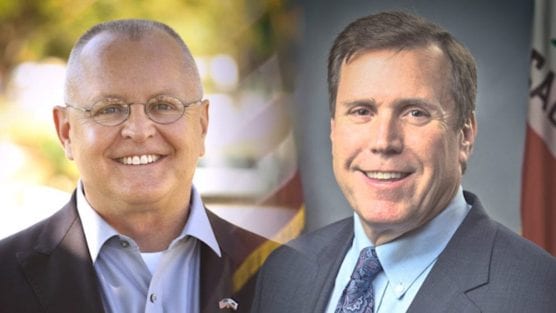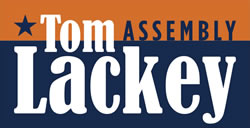
Tom Lackey and Scott Wilk
California Sen. Scott Wilk (R-Santa Clarita) and Assemblyman Tom Lackey (R-Palmdale) have been named two of California’s most bipartisan lawmakers, based on the percentage of bills they’ve authored with a member of the opposite party.
CalMatters’ Ben Christopher reported Tuesday that both Wilk and Lackey have authored more than half of their bills with Democrats, making them the two legislators most likely to cross the aisle.
Wilk has co-authored bills with Democrats 54.8 percent of the time, which was good enough to place first in a roundup of elected representatives, while Lackey was a close second with 51 percent of his bills sharing a Democratic co-author. The two led the way for California Republicans, who had 10 lawmakers with higher percentages than the highest-scoring Democrat.
Wilk said he is proud to see his and Lackey’s names on the list.
“For me, it’s always been my philosophy to work with others,” Wilk said, remembering an old meeting with former Assemblyman Cameron Smyth. “He gave me great advice… and that’s something I always try to remember during the legislative process.”
Wilk said being open to new ideas and working with others fosters good will.
“I think overall, California is going in the wrong direction,” Wilk said, but working with his peers has allowed him a seat at the table and bolstered his efforts in approving a new water agency and passing a bill allowing the state to grow industrial hemp.
“It’s easy to say no to a bill,” Wilk said. “It’s not always safe to cross, but I’m here to decide what’s best for my district.”
“Taking that approach has paid dividends and allowed me to be able to deliver results to my (constituents),” Wilk said.
George Andrews, who serves as Lackey’s chief of staff, said it’s also important to remember that constituents will expect a certain level of bipartisanship.
“We understand we work for an area and people who are represented by both parties,” Andrews said. This has been the case since Lackey served as a City Council member in Palmdale.
In the article, Christopher states the results aren’t necessarily a product of Republicans being more inclined to bipartisanship. “There just aren’t very many Republicans in Sacramento these days,” he said, adding, “GOP lawmakers who want to actually make a law typically have to enlist some Democratic coauthors.”
Andrews disagreed with this thought Thursday.
“All legislators have to go through the process, garner support and build consensus amongst their peers,” Andrews said. “It doesn’t matter Republican or Democrat, we’re trying to get things done.”
